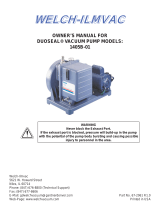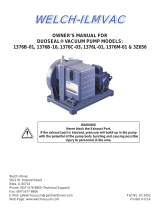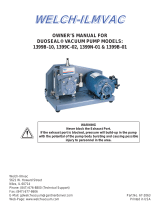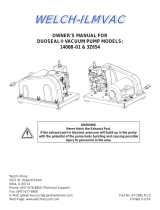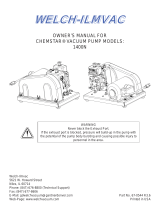Page is loading ...

OWNER’S MANUAL
FOR
DRY VACUUM PUMP
MODEL: 2581
Warning
Not recommended for pumping acid, base or
organic vapors or gases.
Warning
Be sure to properly identify intake and discharge
before using pump. See section 2.5
Part No. 642806
Printed in USA
Gardner Denver Welch Vacuum Technology, Inc.
5621 W. Howard Street
Niles, IL 60714
Phone: (847) 676-8800
Fax: (847) 677-8606 (Technical Support)
E-Mail: gdwelchvacuum@gardnerdenver.com
Web-Page: www.welchvacuum.com

INSTRUCTION
WARNING AND CAUTION
PLEASE READ BEFORE OPERATION
While reading your manual, please pay close attention to areas labeled:
WARNING AND CAUTION.
The description of each is found below.
WARNING
Warnings are given where failure to observe instruction could result
in injury or death to people.
CAUTION
Cautions are found where failure to observe the instruction could result
in damage to the equipment, associated equipment and process.
These units conrm to the SI International system of units of measurement.
The following symbols (with recommendation of IEC1010 ) of warning will be found on the pump.
Caution - refer to accompanying documents
Caution - risk of electrical shock
Caution - hot surface
WARNING
Motor includes a self resetting thermal cutout and the pump could
restart without actuation under fault condition.
2

TABLE OF CONTENT
Section 01 - Installation
1.01 Unpacking
1.02 Pump Mounting
1.03 Pump Location / Environmental Conditions
1.04 Exhaust Provisions
1.05 Electric Power
1.06 Vacuum Connections
1.07 Vacuum Gauges
1.08 Vacuum Pump Oil
Section 02 - Pump Features & Principles of Operation
2.01 General Description
2.02 Principles of Vacuum Pump Operation
2.03 Effects of Continued Pressure Reduction
2.04 Ultimate Pressure
2.05 Pump Mechanism Description
2.06 Intake Anti-Suckback Protection
2.07 Pump Lubrication
2.08 Exhaust Filter
2.09 Gas Ballast Valve
2.10 UNIBARBTM Intake Fitting
Section 03 - Specications
3.01 Specication Chart
Section 04 - Motor Power Specications / Features
4.01 Motor Specication Chart
4.02 Changing the Voltage Settings for
Global Motor Option on “A”-Models
4.03 Changing the Voltage Settings for
Global Motor Option on “C”-Models
4.04 Changing the Voltage Settings on “A”-Models
4.05 Other Electrical Congurations
4.06 Explosion Proof Pumps
Section 05 - Operation
5.01 Starting Procedure
5.02 High Pressure Operation
5.03 Shutdown Procedures
Section 06 - Specications
6.10 Pump Specication Chart
6.11 Pumping Speed Curves
6.12 Dimensional Drawing
6.17 Parts List and Exploded View for Pump Model 2581
Section 07 - Specications
7.20 Vacuum System for Vacuum Chamber, Glove Box, Annular Space & Transfer Line:
7.21 System Components
7.22 Vacuum System for Cell Harvesting
Warranty
3

4
Section 1: SAFETY INFORMATION
I.10 CAUTION: To prevent injury....
I.11 Never operate this product if it has a damaged cord or plug. If it is not working properly, has been
dropped, damaged or has fallen into water, please return the product to a Welch service center for
examination and repair.
I.12 Keep the cord away from the heated surfaces.
I.13 Never block any air openings or place it on a soft surface where the openings may be blocked.
The air openings are for ventilation of the motor inside the housing. Keep all air openings free of lint,
dirt and other foreign objects.
I.14 The PTFE pump is thermally protected and can automatically restart when the protector resets.
Always disconnect power source before servicing.
I.15 Wear safety glasses or goggles when operating this product.
I.16 Use only in well ventilated areas. The motor is fan cooled enclosed in a shell.
I.17 All electrical products generate heat. To avoid serious burns never touch unit during or immediately
after operation.
I.18 Be sure to properly identify intake and discharge before using pump. See Section II-5.
I.20 CAUTION: To reduce risk of electrical shock....
I.21 Do not disassemble. Disassembly or attempted repairs if accomplished incorrectly can create
electrical shock hazard. Refer servicing to qualied service agencies only:
Call (847) 676-8800 Ext. 1
I.22 Unit is supplied with a three pronged plug. Be sure to connect pump to a properly grounded
outlet only.
I.23 WARNING: To reduce risk of electricution…
I.24 Do not use this product in or near area where it can fall or be pulled into water or other liquids.
I.25 Do not reach for this product if it has fallen into liquid. Unplug immediately.
I.26 Never operate this product outdoors in the rain or in a wet area.
I.27 DANGER: To reduce risk of explosion or re…
I.28 Do not use this pump near explosive atmospheres or where aerosol (spray) products are being used.
I.29 Do not use this product near ames.
WARNING
Do not operate the pumps in an atmosphere containing
flammable or explosive gases/vapors.
WARNING
Never block the exhaust port. If the exhaust is blocked, pressure
will build-up in the pump with the potential of the pump head
bursting and causing possible injury to personnel in the area.
WARNING
Failure to observe the above safety precautions could result
in severe bodily injury, including death in extreme cases.

5
Section 2: INSTALLATION
2.10 Introduction
This manual has been compiled not only for the care and maintenance of the Welch Dry Vacuum System
now in your possession, but as a helpful reference and guide to prevent many problems which can occur
if used improperly.
2.11 Unpacking
Carefully remove the Dry Vacuum System from the shipping carton. Preserve all paperwork for future
reference. If damage has occurred from shipment a claim must be led with the carrier immediately;
preserve the shipping carton for inspection by the carrier. If you are required to communicate with your
dealer or Welch Vacuum be sure to include your order numbers for quick identication. Do not return
the system to the factory without rst calling for a returned goods number. Call (847) 676-8800
2.12 System Mounting
Rubber feet are attached to the pump. Rubber feet are excellent for applications involving a
semi-exible surface such as a bench top; they help to isolate noise and eliminate creeping.
2.13 System Location and Enviromental Condition
The Dry Vacuum System should be located preferably in a clean, dry and well ventilated area. Please
be sure not to block the ventilation ports located on the metal shell. The pump should be placed where
the surrounding temperature remains between 10°C and 40°C (50°F and 104°F). Always check to insure
the location chosen is protected from direct or indirect moisture contact. The pump should be located as
closely to its system in order to utilize it most efciently. The pump is rated for indoor use only.
Maximum altitude 2000 meters. Operating temperature range 5°C to 40°C. Maximum relative humidity
of 80% for temp. up to 31°C decreasing to 50% at 40°C. Rated for ±10% of supply voltage.
Pollution Degree2, Installation Category II.
2.14 Inlet and Outlet Provisions
A inlet hose barb which accepts ¼” I.D. hose makes it easy to connect the system to your concentrator,
rotary evaporator or gel dryer. Since the vacuum system operates in the viscous ow regime, the small
diameter of the hose will generate minimal conductance loss. For best results, Welch recommends the
length of the tubing between the pump and the apparatus be kept as short as possible. Hose clamps
should be used to hold the hose in place.
The hose barb in the outlet port of the pump accepts ¼” ID hose. A vent line can be attached to the
outlet hose barb which allows gases and vapors pumped through the pump to be piped to a fume hood.
Be sure to call Welch technical service prior to start-up at (847) 676-8800 if you have any questions.
WARNING
Don’t operate this pump in an atmosphere
containing flammable or explosive gases or vapors.
WARNING
The motor is thermally protected and will automatically
restart unexpectedly when the overload device resets.
WARNING
Never Block The Outer Port. If the outlet is blocked, pressure will
buildup in the pump which can lead to the pump head bursting
creating the potential of serious injury.
Remove plug from outer port.

6
2.20 Electrical Power
2.21 Power Source Review
Review the power source and the voltage rating on the units serial number tag to be sure they agree in
voltage, phase and frequency. Serious damage may occur to the system if it is connected to an improper
voltage. All Welch systems must be grounded. Grounding reduces the risk of electric shock in the event
of an electrical short circuit. The plug must be plugged into an outlet properly grounded. Consult your
local electrical codes if you have doubts.
2.22 Overload Protection
The motor manufacturer makes motor thermal overload protection availeble as an aid to minimize motor
failure. Overload protection is a standard feature on both 50/60Hz single-phase motors. The motors have
automatic overload protection. Automatic reset protection is designed to reset itself after a
predetermined cooling period. If the fault to the drive remains unaltered, the motor will cycle on and off
until fault is corrected.
2.23 Identication Symbols
2.24 Grounding Instructions
This product should be grounded. In the event of an electrical short circuit, grounding reduces the risk
of electric shock by providing an escape wire for the electric current. This product is equipped with a
cord having a grounding wire with a grounding plug. The plug must be plugged into an outlet that is
properly installed and grounded in accordance with all local codes and ordinances.
This adapter shown in Figure B and Figure C is not acceptable in Canada.
If repair or replacement of the cord or plug is necessary, do not connect the grounding wire to either at
blade terminal. The wire with insulation having an outer surface that is green with or without yellow
stripes is the grounding wire.
Check with a qualied electrician or serviceman if the grounding instructions are not completely
understood, or if in doubt as to whether the product is properly grounded. Do not modify the plug
provided; if it will not t the outlet, have the proper outlet installed by a qualied electrician.
DANGER
Improper installation of the grounding plug
can result in a risk of electrical shock.

7
This product is for use on a nominal 120V circuit, and has a grounding plug that looks like the plug
illustrated in Sketch A in Figure #1. A temporary adapter, which looks like the adapter illustrated in
sketches Band C, may be used to connect this plug to a 2-pole receptacle as shown in sketch B if a
properly grounded outlet is not available.
The temporary adapter should be used only until a properly grounded outlet (Sketch A) can be installed
by a qualied electrician. The green colored rigid ear, lug, etc. extending from the adapter must be
connected to a permanent ground such as a properly grounded outlet box cover. Whenever the adapter is
used, it must be held in place by a metal screw.
2.25 Extension Cords
If necessary to use an extension cord, use a 3-wire extension cord that has a 3-blade grounding plug,
and a 3-slot receptacle that will accept the plug on the product. Make certain your extension cord is
in good condition. Make certain your extension cord wire size is not less than 18 gauge for 25 feet, 16
gauge for 50 feet, and 14 gauge for 100 feet. An undersized cord will cause a drop in line voltage
resulting in loss of power and overheating. If in doubt, use the next heavier cord. The smaller the gauge
number, the heavier the cord.
2.26 Dial Vacuum Gauge
A dial vacuum gauge is incorporated in the vacuum system. The dial gauge is located in the top front
section of the system. The dial vacuum gauge is commonly used to indicate vacuum level when
operating in the rough vacuum range (0 to 29.9”Hg) Dial vacuum gauges give negative pressure - that is
pressure below atmospheric. The reference point for the gauges is atmospheric pressure. Please keep
in mind that atmospheric pressure tends to vary from day to day. As a result of this variability, a dial
vacuum gauge will indicate slightly different maximum vacuum readings from day to day.
2.27 Vacuum Level Regulation
Vacuum level regulation is accomplished with an adjustable bleed valve. The adjustable bleed valve
allows close control of pressure in your apparatus. Pressure may be set between roughly atmospheric
pressure and the maximum vacuum obtainable (9 torr, 29.6 in Hg).
2.28 Vacuum Connections
All Dry Vacuum Pumps come with intake and discharge hose barbs which accept 3/8” ID rubber
pressure/vacuum hose. Hose clamps should be used to hold the hose in place. Since all six models
operate in the viscous ow range, the small diameter of the hose will generate minimal conductance
loss. For best results, Welch recommends the length of the tubing between the pump and the chamber
be kept as small as possible.
2.29 Vacuum Gauges
Typical in the rough vacuum range, a dial vacuum gauge is used to measure pressure in mm, Hg or
inches of Hg. The dial vacuum gauge gives negative pressure – that is pressure below atmospheric.
The reference point for the vacuum gauge is atmospheric pressure.
Please keep in mind that atmospheric pressure tends to vary from day to day. As a result of variability,
the dial vacuum gauge will indicate slightly different maximum vacuum readings from day to day.

8
2.30 Traps
2.31 The need for a Trap
The pumps will handle humid air. All wetted aluminum parts are treated for corrosion protection from
moisture. All other wetted parts are stainless steel. If there is a chance liquid may be drawn from the
process under evacuation, Welch recommends a liquid trap be placed between the process and the pump.
A simple liquid trap is a ltering ask.
When a heavy load of water vapor is evolved from the vacuum process, a cold trap is recommended to
help prevent damage to the pump mechanism. The cold trap, immersed in a suitable Dewar ask, is
installed so that the water vapor may come in contact with the surfaces of the trap and condense.
Commonly used refrigerants are liquid nitrogen or dry ice and acetone or alcohol. Dry ice provides
sufcient cooling to freeze out most heavy water vapor loads. A variety of cold traps are available from
Welch.
The symptom of a high water vapor load is if you have droplets coming out of the exhaust port. If you
see droplets of water, Welch recommends you use a cold trap to capture the water before entering the
pump or dilute the water vapor stream by adding dry nitrogen to the gas ow. Please call our customer
service department for additional information at (847) 676-8800 Ext. 1.
2.32 The care of a Trap
When using a cold trap the refrigerant should be maintained at a high level in the ask to keep the trap
at a uniformly low temperature. If the trap is re-warmed it may allow re-evaporation of the
ondensate. The refrigerant add tube on the liquid nitrogen trap should not be obstructed as the
refrigerant boil-off can produce dangerously high pressures. If the trap becomes saturated it should be
disconnected from the system, drained and cleaned. An increase in pressure in the vacuum system will
normally indicate that the trap has become saturated. To clean the trap, remove the trap from the system
and allow the trap to warm up and rinse off the condensate with a suitable solvent in a fume hood.
Thoroughly clean and dry the trap before reinstalling into the system.

9
Section 3: OPERATION
3.10 Starting Procedures
3.11 Starting a Welch Dry Vacuum Pump
Before attaching the pump to a system it is well to familiarize yourself with the function and action of
the pressure vacuum pump that you have acquired. Review the power requirements as described in
Section 2.6. Welch recommends running the pump for a few minutes to warm up before use. The
warm-up improves the pump’s ability to handle humid air.
3.12 Cleanliness
Take every precaution to prevent foreign particulates from entering the pump. Particulates will damage
the pump’s performance. If you nd that particulates will come off the process during evacuation, a
particle trap in the foreline will work. A simple, inexpensive trap may be made by placing glass wool in
a glass or plastic tube. Screens must be inserted to hold the glass wool in place.
3.13 Leak Detection
The importance of eliminating all leaks in a vacuum system is obvious. The pump must remove this
added volume of leaked gas to maintain the desired vacuum. Leaks for these pumps can be located by
slightly pressuring the system and painting the suspected area with a thick soap solution. Escaping air
will produce soap bubbles.
3.14 Operating Pressure Range
Model 2581 Dry Vacuum Pumps are designed to be run from atmospheric to their maximum vacuum
level on the intake side. Consult the Specication Table in the back of this manual for the ratings for
your specic model.
3.15 Shutdown Procedures
After use, Welch recommends the pump be run for about 2 minutes disconnected from the vacuum
process. The air pumped through the mechanism will purge out water vapor or droplets of water
condensate that may have formed on the inside of the pump. This purge of the pump mechanism helps
prevent corrosion.
Section 4: MAINTENANCE
Welch dry pressure\vacuum units are 100% oil-free. The pump employs a non-lube piston and cylinder.
No maintenance is necessary for the bearings. All bearings are sealed and permanently lubricated.
Lubrication should not be attempted. The units are built for continuous duty operation with the
quietness and durability of a diaphragm, but with piston p
WARNING
The Pump is not recommended for pumping acid, base or organic
vapors or gases. Serious damage to the pump will shorten the
pump’s service life.In addition, pumping flammable vapors or
gases can lead to serious safety hazard leading to fire or explosion.

10
Section 5: TROUBLESHOOTING
5.10 Vacuum Problems
Leakage, contamination and unusual outgassing are the general causes of problems with poor vacuum.
To operate at maximum efciency a system must be thoroughly clean. If the system is completely clean
and free from leaks, and unwarranted vacuum problems still exist, the pump should be checked. A
simple criterion for the condition of the pump is the determination of its maximum vacuum capability.
This can be accomplished by blocking of the intake and reading the vacuum level on the gauge
(See Section 2.8).
5.11 Troubleshooting Guide
Poor
Pumping
Speed
Poor
Vacuum
Loud
Unit Possible Cause Corrective Action
X X X Damaged valves Replace apper valves
X X X Debris in valves Remove debris and check for valve damage
X X X Damaged gasket Replace gasket
X X X Loose head screw Tighten head screw
X X X Loose tting Tighten tting

11
Section 6: SPECIFICATION
6.10 Pump Specication Chart
Welch Model 2581
Free Air Displacement
CFM (L/min.) @60Hz (100)
M3 (L/min.) @50Hz (83)
Ultimate Pressure
Torr 5
(mbar) (6.7)
Maximum Vacuum In.Hg. 29.8
Motor Horsepower
Horsepower 1/3
(watts) (250)
Tubing needed
I.D. in Inches 3/8
(I.D. in Millimeters) (10)
Intake & Exhaust Thread NPT 3/8
Weight lbs 22.5
(Kg.) (10.3)
Overall Dimensions
L in Inches (cm) 17.0 (43.2)
W in Inches (cm) 7.5 (19.1)
H in Inches (cm) 12.0 (30.5)
Shipping Weight
lbs 27.5
(Kg.) (12.5)
Shipping Dimensions
L in Inches (cm) 19.5 (49.5)
W in Inches (cm) 20.5 (52.0)
H in Inches (cm) 16.0 (40.6)
Catalog Number
Catalog Number w/ Jar & Regulator Wired for 115V, 60Hz, 1Ph with N.American 115V Plug 2581B-50
Catalog Number w/ Jar & Regulator Wired for 230V, 50Hz, 1Ph with Cont. Euro (Schuko) 230V Plug 2581C-50
Catalog Number w/ Jar & Regulator Wired for 100V, 50/60Hz, 1Ph 2581C-56

12
6.11 Pumping Speed Curves

13
6.12 Dimensional Drawing
Dimensions of Pump Model 2581 (inches)
A B C D E F G H I J K L M N
12.5 121 7.6 5.25 10.5 8.5 8.85 8.5 3.06 0.59 2.7 0.59 4.5 6

14
6.17 Parts List and Exploded View for Pump Model 2581
Item
Number Qty. Part No. Description
Service
Kit
Seal Kit Feet Kit
2581K-03 2581K-04 2500K-04
1 2 Note 1 Piston Cup - - -
2 2 Note 1 Cylinder Sleeve 2 - -
3 2 Note 1 O-Ring Cylinder 2 - -
4 1 Note 1 Valve Intake / Intake Stage 1 1 -
5 2 Note 1 Valve Exhaust 2 2 -
6 2 Note 1 O-Ring Valve Plate 2 2 -
7 2 Note 1 O-Ring Connector Tube 2 2 -
8 8 Note 1 Head Screw 6 - -
9 1 Note 1 Valve Intake / Exhaust Stage 1 1 -
10 4 Note 1 Rubber Suction Feet - - 4
11 2 Note 1 Handle Screw 2 2 -
Note 1: Parts available in kits
shown in the following last three
columns.

15
Section 7: APPLICATION INFORMATION
7.20 Vacuum System for Vacuum Chamber, Glove Box, Annular Space & Transfer Line:
- 2581B-50
- 2581C-50
- 2581C-56
7.21 System Components
7.22 Vacuum System for Cell Harvesting:
Welch’s new portable oil-free general utility roughing pumps provide continuous, reliable vacuum that
your vacuum chamber, glove box, annular space and transfer line applications require. The pumping
mechanism is an economical twin head oil-free Wob-L® known for reliability and durability. These
rugged pumps handle 20,000 plus roughing cycles – from atmospheric to 5 Torr – before needing seal
maintenance.
The pumps come completely equipped and ready to use. An inlet trap to help prevent ingestion of uids
into the pump, a dial gauge for continuous vacuum level monitoring, and a vacuum regulator to adjust
vacuum levels. Just plug it in and you’ re up and running.
Choose Model 2581B-50 for evacuating vacuum ovens, annular spaces, transfer lines and purging a
glove box up to 30 cubic feet. For Vacuum Ovens, Model 2561B-50 is suited for 1.5 cubic foot ovens or
smaller and Model 2581B-50 can be used for up to 3.5 cubic feet.
The pumping speed of the 2561 and 2581 at rough vacuum levels is equal to oil-seal rotary vane pumps
of similar size. This makes the 2561 and 2581 an economical, oil-free solution for replacing oil-seal
rotary vane pumps. These pumps are therefore highly recommended for standard duty laboratory
applications, general vacuum work and where quick roughing of a chamber is needed.
The 2581 and 2561 pump Models are for use in standard duty applications. This means that they are not
recommended for pumping acidic, basics or organic vapors or gasses. If you are looking for a pump to
handles these types of conditions, contact a Welch representative and they will be able to assist you in
selecting the correct pump for your application.
Qty. 2581 Description
1 61-3576 Jar Assembly
1 61-5142 Needle Valve Miniature
1 61-5148 Instrument Knob
1 624280 Hose Barb, 3/8” NPT
1 66-0136 Hose Barb, Male Straight Kynar
1 62-1066 Nipple Hex 3/8” x 1”
1 or 1 638788 Vacuum Gauge, kPa / in. Hg.
633210 Vacuum Gauge, cm Hg. / in. Hg.

16
Gardner Denver Welch Vacuum Technology, Inc.
5621 W. Howard Street
Niles, IL 60714
Phone: (847) 676-8800
Fax: (847) 677-8606 (Technical Support)
E-Mail: gdwelchvacuum@gardnerdenver.com
Web-Page: www.welchvacuum.com
Copyright© 1997-2007 Gardner Denver Welch Vacuum Technology, Inc.
Welch is registered trademarks of Gardner Denver
Warranty
This Welch Vacuum product is warranted to be free from defects in material and workmanship. This
liability of Gardner Denver Welch Vacuum Technology under this warranty is limited to servicing,
adjusting, repairing, or replacing any unit or component part which in the judgment of Gardner Denver
Welch Vacuum Technology has not been misused, abused, or altered in any way or damaged by
ingestion of foreign material causing impaired performance or rendering it inoperative. No other
warranties are expressed or implied. The method of executing this warranty: servicing, adjusting,
repairing, or replacing, shall be at the discretion of Gardner Denver Welch Vacuum Technology.
Vacuum pumps that have been operated within a vacuum system, or other system, for any period,
however short, will be repaired under this warranty rather than replaced.
The warranty is effective for one year from the date of original purchase when:
1. The warranty card has been completed and returned.
2. The product is returned to the factory or other designated service centers, freight prepaid.
3. The product in our judgment is defective through no action or fault of the user.
If the product has become defective through misuse, abuse, alteration, or ingestion of foreign material,
repairs will be billed regardless of the age of the product. In this event, an estimate of the repair costs
will be submitted and authorization of these charges will be required before the product is repaired and
returned.
642806
/
